Training Program Turns Lived Experiences into Peer Support
A Comprehensive Center for Pain and Addiction program trains people to become peer support specialists in underserved areas of Arizona.

PeerWORKS apprentices gain the education and work experience needed to become a behavioral health paraprofessional, placing them in a unique position to reach out and support individuals in recovery through their own lived experiences.
Jessica Champ’s history with substance use disorder began when most children are starting middle school.
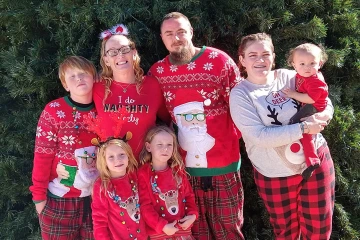
Jessica Champ's family inspired her recovery. (From left, back row) son Jordan, Jessica Champ, fiance Brian, eldest daughter Ausha and grandson Jayson. (Front row) twins Karizma and Jessinda
“I started injecting methamphetamines around 11 years old,” Jessica Champ said. “My mother was working 14 hours a day. She had no idea my ex-stepfather was dealing drugs and molesting me. I stole the drugs from him.”
By the time she was 17, she had quit school and been in-and-out of juvenile detention. Champ says she was able to get clean for short periods of time, but it never stuck. She ended up with multiple felonies – 19 total. It was not until she was facing a possible 25-year prison sentence that Champ finally made a permanent change.
“I had already missed out on the first nine years of my daughter’s life, because I gave birth to her while I was serving a prison sentence and then couldn’t see her when I got out due to addiction and other circumstances. I didn’t get to hold her or touch her or nothing for nine years,” Champ said. “This time, my daughter was pregnant, and I was looking at going away again. I knew if I didn’t sign a plea deal and complete rehabilitation, I would miss my grandchild’s entire childhood. My daughter also told me if I was still on drugs when the baby was born, she wouldn’t allow me to be part of his life.”
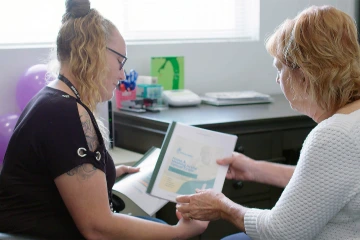
Jessica Champ lives in a small town in Graham County just outside of Safford, Arizona. As a peer support specialist, she uses her lived experience to help others with substance use disorder.
It was the motivation she needed. Champ was able to recover with the help of a rehabilitation program. Soon, she found joy in helping other people suffering from addiction. She could talk to them about her own experiences and tell them about services they might need.
“I just felt like this was something I was meant to do. After everything I had been through, I wanted to help people,” she said. “But I didn’t really know any of the techniques, and I definitely was not certified.”
Eventually, Champ learned about a behavioral health certification program called PeerWORKS, where she could turn her passion into a profession. Developed by the University of Arizona Health Sciences Comprehensive Center for Pain and Addiction , PeerWORKS trains people who have lived experiences with substance use disorder or mental health issues to be peer support specialists and help others on their recovery paths.
Increasing support for those in need
It has been years since the opioid epidemic first made headlines in the U.S., but it remains a public health crisis. According to the Arizona Department of Health Services, there were 2,006 opioid overdose deaths in Arizona in 2021. That equates to a fatality rate of 27.5 people per 100,000, or more than five deaths every day of the year.
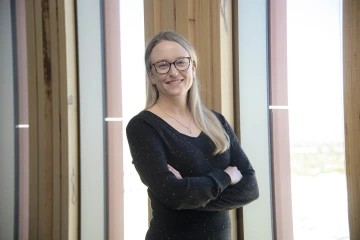
Jennifer De La Rosa, PhD, is a methodologist and social network analyst whose research interests focus on the intersection of health care and the social determinants of health, including programs and policies that can help ensure self-determination for individuals and communities.
Research has shown that peer support specialists can reduce substance use and depression in the people they work with, noted Jennifer De La Rosa, PhD, director of strategy at the Comprehensive Center for Pain and Addiction and PeerWORKS’ director of evaluation. The impact on support services is measurable, as well.
“There is good evidence that having peer support helps people to not access levels of care unnecessarily. For example, hospitalizations are reduced, emergency department visits are reduced, and preventative primary care is increased,” she said. “They are protecting these more elevated levels of health care.”
The goal of PeerWORKS is to increase the number of peer support specialists qualified to provide services in integrated care settings in Arizona’s rural and underserved communities.
“I wanted to be a positive force for change in the Safford area,” Champ said. “I get to watch it grow and see people I have helped flourish. It is probably one of the coolest things I have ever done.”
Peer support specialists use their unique lived experience to develop trust and build a rapport with people with substance use disorder or mental illness. They can be found in a variety of workplaces, including clinics where people receive medication-based treatment for substance use disorders, rural health centers and sober-living houses.
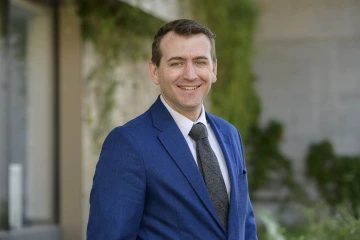
Benjamin Brady, DrPH, takes a public health approach to addiction that accounts for social and environmental influences. His research interests include evaluating substance misuse policies, treatment services, and increasing access to care.
“Peer support specialists are an enhancement of a traditional clinical practice,” Dr. De La Rosa said. “This is someone whose role is to share, when therapeutically helpful, that they have had some of these same experiences.”
The program starts with six months of online training on topics including the effects of addiction on the brain, how opioid use disorder impacts adolescents and families, wellness planning, and how to advocate for resources such as housing.
“I had never really done any kind of schooling like this,” Champ said. “But I quit my job so I could focus on the classes and make them a priority.”
Trainees also job shadow at a growing list of community partner facilities and have the option to apply for a 12-month apprenticeship. Current partners include Banner Health, Sage Memorial, the Regional Center for Border Health and the House of Hope, where Champ now runs the reentry program.
“I was actually bringing a friend in for resources when they asked if I might be interested in applying for a job,” she said. “I told them I was already in the process of getting certified through PeerWORKS and had already sent them a resume. A couple weeks later I was working there.”
Expanding access to care
PeerWORKS is the newest training program launched by the Comprehensive Center for Pain and Addiction (CCPA), which focuses on all aspects of pain and substance use disorder.
“CCPA is a gravitational center for organizations, faculty members, and advocacy groups inside the university and statewide,” said CCPA member Benjamin Brady, DrPH, assistant research professor in the Mel and Enid Zuckerman College of Public Health. “It brings together like-minded folks to work on shared issues.”
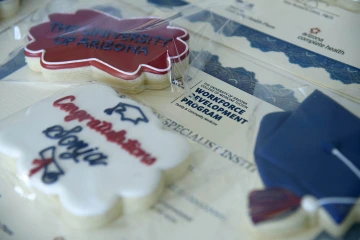
The Comprehensive Pain and Addiction Center collaborates with the Workforce Development Program on PeerWORKS and Project FUTRE. Graduates of both programs are encouraged to apply for a paid apprenticeship with a behavioral health agency or integrated health care provider.
The program is made possible by a four-year, $2.2 million federal grant from the Health Resources and Services Administration. The HRSA aims to provide equitable health care to people who are geographically isolated and economically or medically vulnerable.
To launch PeerWORKS, CCPA members collaborated with the Workforce Development Program in the College of Medicine-Tucson’s Department of Family and Community Medicine and the UArizona Center for Rural Health in the Mel and Enid Zuckerman College of Public Health.
“The Department of Family and Community Medicine’s RISE Workforce Development Program was one of the pioneering programs to promote recovery-oriented systems of care, to appreciate the role of work in recovery, and to train and certify peer recovery support specialists in the state of Arizona,” said Cheryl Glass, MBA-HCM, director of the Workforce Development Program, which started peer support specialist training in 2005.
The Workforce Development Program also collaborates with CCPA on Project FUTRE (Families Uplifted Through Recovery Education). Project FUTRE is increasing the number of behavioral health paraprofessionals trained to work with children and families whose lives have been impacted by opioid use disorder and other substance use disorders.
Champ is one of the first eight peer support specialists to complete PeerWORKS. Her success is an example of the life-changing power of peer support, not just for the person receiving services, but for the peer support specialist, too.
“I know this program is not a college degree, but as far as my family is concerned it is. They are so proud of me,” Champ said. “I get to be part of a positive change in my community, I get to be there for my kids and grandkids, and I get to help people.”
Contact
Brian Brennan
Health Sciences Office of Communications
520-621-3510
brianbrennan@arizona.edu

